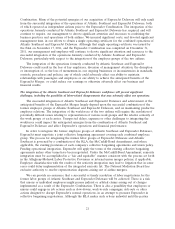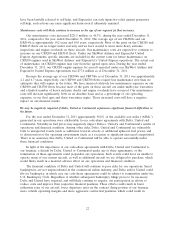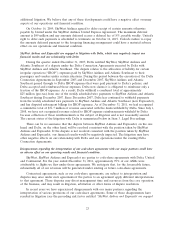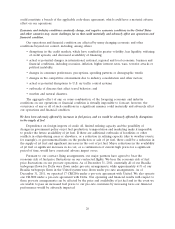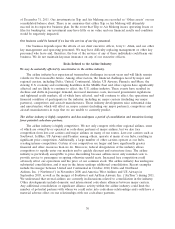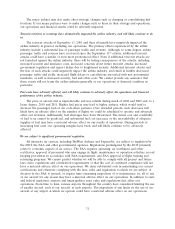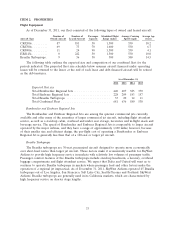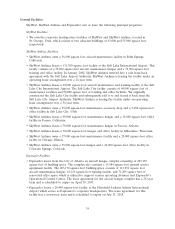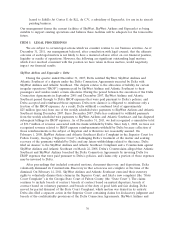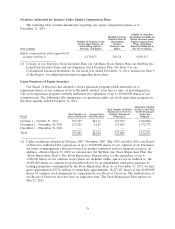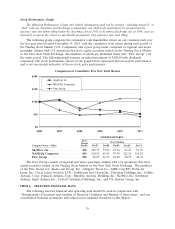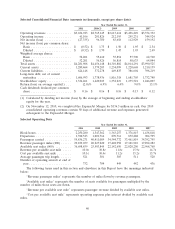SkyWest Airlines 2011 Annual Report Download - page 35
Download and view the complete annual report
Please find page 35 of the 2011 SkyWest Airlines annual report below. You can navigate through the pages in the report by either clicking on the pages listed below, or by using the keyword search tool below to find specific information within the annual report.The major airlines may also make other strategic changes such as changing or consolidating hub
locations. If our major partners were to make changes such as these in their strategy and operations,
our operations and financial results could be adversely impacted.
Terrorist activities or warnings have dramatically impacted the airline industry, and will likely continue to do
so.
The terrorist attacks of September 11, 2001 and their aftermath have negatively impacted the
airline industry in general, including our operations. The primary effects experienced by the airline
industry include a substantial loss of passenger traffic and revenue. Although, to some degree, airline
passenger traffic and revenue have recovered since the September 11th attacks, additional terrorist
attacks could have a similar or even more pronounced effect. Even if additional terrorist attacks are
not launched against the airline industry, there will be lasting consequences of the attacks, including
increased security and insurance costs, increased concerns about future terrorist attacks, increased
government regulation and airport delays due to heightened security. Additional terrorist attacks and
the fear of such attacks could negatively impact the airline industry, and result in further decreased
passenger traffic and yields, increased flight delays or cancellations associated with new government
mandates, as well as increased security, fuel and other costs. We cannot provide any assurance that
these events will not harm the airline industry generally or our operations or financial condition in
particular.
Fuel costs have adversely affected, and will likely continue to adversely affect, the operations and financial
performance of the airline industry.
The price of aircraft fuel is unpredictable and was volatile during much of 2008 and 2009 and, to a
lesser degree, 2010 and 2011. Higher fuel prices may lead to higher airfares, which would tend to
decrease the passenger load of our code-share partners. Over extended periods, such decreases will
likely have an adverse effect on the number of flights we could be scheduled to operate and adversely
affect our revenues. Additionally, fuel shortages have been threatened. The future cost and availability
of fuel to us cannot be predicted, and substantial fuel cost increases or the unavailability of adequate
supplies of fuel may have a material adverse effect on our results of operations. During periods of
increasing fuel costs, our operating margins have been, and will likely continue to be, adversely
affected.
We are subject to significant governmental regulation.
All interstate air carriers, including SkyWest Airlines and ExpressJet, are subject to regulation by
the DOT, the FAA and other governmental agencies. Regulations promulgated by the DOT primarily
relate to economic aspects of air service. The FAA requires operating, air worthiness and other
certificates; approval of personnel who may engage in flight, maintenance or operation activities; record
keeping procedures in accordance with FAA requirements; and FAA approval of flight training and
retraining programs. We cannot predict whether we will be able to comply with all present and future
laws, rules, regulations and certification requirements or that the cost of continued compliance will not
have a material adverse effect on our operations. We incur substantial costs in maintaining our current
certifications and otherwise complying with the laws, rules and regulations to which we are subject. A
decision by the FAA to ground, or require time-consuming inspections of or maintenance on, all or any
of our aircraft for any reason may have a material adverse effect on our operations. In addition to state
and federal regulation, airports and municipalities enact rules and regulations that affect our
operations. From time to time, various airports throughout the country have considered limiting the use
of smaller aircraft, such as our aircraft, at such airports. The imposition of any limits on the use of our
aircraft at any airport at which we operate could have a material adverse effect on our operations.
31


